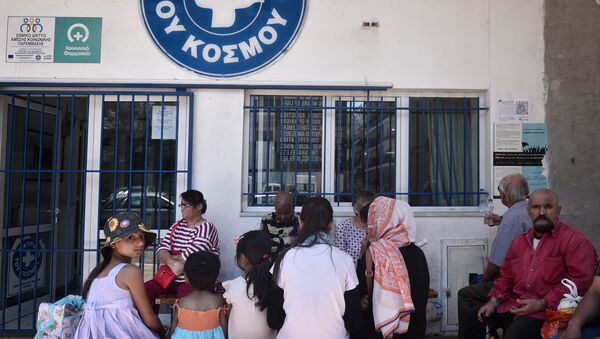"After 20 March 2016, the hotspots became detention centers and people are stuck here, making the situation on the island worse," said Koutsoumani.
More protests in #Moria on #Lesbos yesterday as refugees' frustration grows with long delays & ongoing detention pic.twitter.com/4UYccagjSw
— John D McHugh (@johndphoto) May 17, 2016
"The longer they remain here the more it increases their medical needs and our clinics are full and we have to treat more and more patients.
"There are 900 people in our clinic for the most vulnerable cases, which includes pregnant women," Koutsoumani, who is based on Lesbos told Sputnik.
In what's fast becoming a familiar story on the Greek islands, Koutsoumani says the biggest problem is that people do not have any information about their fate.
Her baby needs a doctor. At Kara Tepe site for @Refugees on #Lesvos she will see one. #progress pic.twitter.com/yYx9gdSwN7
— Chris Boian (@ChrisBoian) May 19, 2016
"It makes them feel really insecure. They don't know if they are going to remain in Greece or go to another country, they have no information."
Marooned in Moria
After 25 days of detention in deteriorating conditions, migrants are free to move around the island — but they must not leave Lesbos. Being able to leave the camp "has helped remove some of the tensions because they are no longer imprisoned," Koutsoumani told Sputnik, "but being in detention takes adjusting to."
Improvised A/C: @Refugees pack water-soaked reeds in #Lesvos #shelter windows 2 keep cool. Works! @UNRefugeeAgency pic.twitter.com/Q3VdhAr3gi
— Chris Boian (@ChrisBoian) May 20, 2016
Meanwhile, local media report that dozens of migrants have been arrested after attempting to board a ferry bound for Athens by hiding in trucks and cars after leaving the Moria registration center.
Others who remain marooned on the island after their 25 days in a detention center wander around looking for food and somewhere to sleep. Their fate remains unknown.


